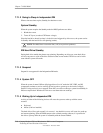
Technical Reference Guide
Compaq Deskpro EXS and Workstation 300 Personal Computers
Featuring the Intel Pentium 4 Processor
First Edition - December 2000
7-19
7.7.2 ACPI SUPPORT
This system meets the hardware and firmware requirements for being ACPI compliant.
This system supports the following ACPI functions:
♦ PM timer
♦ Power button
♦ Power button override
♦ RTC alarm
♦ Sleep/Wake logic (S1,S3, S4 (Windows 2000), S5)
♦ C1 state (Halt)
♦ PCI Power Management Event (PME)
7.7.3 APM 1.2 SUPPORT
Advanced Power Management (APM) is an extension of power management. In APM, the O/S
decides when a transition to another power state should occur. If going to Standby or Suspend, it
notifies all APM-aware drivers requesting approval for the state change. If all drivers approve (the
BIOS is not involved in this process) each is instructed to go to that state, then the BIOS is told to
go to that state. All versions of Windows, later versions of OS/2 and Linux support APM. . The
BIOS ROM for these systems support APM 1.2
The APM functions are initialized when the O/S loads. An INT 15h call is made to see if APM is
supported by the BIOS, and at what level (1.0, 1.1 or 1.2). After that, the O/S gets a 32-bit address
from the BIOS ROM so it can subsequently make 32 bit protected mode calls to access the
different APM functions in the ROM.
Table 7-6 lists all the APM calls that the O/S can make to the BIOS. These functions are the major
difference between PM and APM.


















